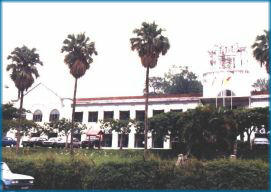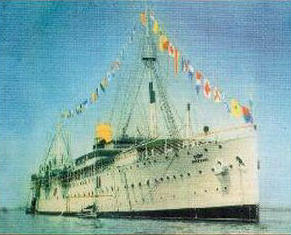 The classic English sea novel, Lord Jim by Joseph Conrad was 'required reading' in English Literature class aboard my pre-sea cadet training ship many years ago. It was a moving story of an idealistic seaman forced to deal with his act of cowardice and how he ultimately redeems himself. He had abandoned a ship and left the passengers to die. This book was later made into an excellent movie in 1965 starring Peter O'Toole and James Mason.
The classic English sea novel, Lord Jim by Joseph Conrad was 'required reading' in English Literature class aboard my pre-sea cadet training ship many years ago. It was a moving story of an idealistic seaman forced to deal with his act of cowardice and how he ultimately redeems himself. He had abandoned a ship and left the passengers to die. This book was later made into an excellent movie in 1965 starring Peter O'Toole and James Mason.I didnt even know it was adapted from a true maritime incident involving an early local kapal haji, the S.S. Jeddah until I read the book review below recently. The heroic tale of our jemaah haji overcoming the odds in the face of adversity is forever lost in time and will never be told. It would have made for an interesting, if not truly inspiring reading. Our own great great grandparents could have been on that ship.
But how times have changed, eh?
PS: The italics and text colouring are mine.
(Movie poster from IMDb Photo Gallery)
------------------------------------------------------------
And you, what are you doing here?
Michael Gilsenan
A Season in Mecca: Narrative of a Pilgrimage by Abdellah Hammoudi ed. Pascale Ghazaleh · Polity, 293 pp, £12.99
The Jeddah sailed from Singapore on 17 July 1880, bound for Penang and Jeddah, with 778 men, 147 women and 67 children on board. Muslims from the Malay Archipelago, they were traveling to Mecca and Medina for the pilgrimage. Some came from the Netherlands East Indies (now Indonesia); some from the different Malay states, then beginning to experience more direct British intervention; some from Singapore.
The ship was under the British flag. Seyyid Muhammad al-Sagoff, the managing director and part-owner of the Singapore Steamship Company, to which it belonged, came from a wealthy Arab family, originally from Hadhramaut in south-east Yemen but already well established in the economy of Singapore and the Hejaz, the region in western Arabia within which lie the holy cities of Mecca and Medina. Seyyid Omar al-Sagoff, Muhammad’s son, was on board. In addition to its Singapore office, the business had an important branch in Jeddah, the main port of the Hejaz, then part of the Ottoman Empire. It also ran an agency in Aden, since its conquest in 1839 a key link in British maritime influence in the Indian Ocean, and after the opening of the Suez Canal in 1869 an even more important port on the Europe-Asia routes. This is the high point of 19th-century imperialism.
After terrible weather conditions in the first week of August, the boilers ‘started adrift from their seatings’. The Jeddah had for some days been taking in water. Now it sprang a heavy leak. The water rose rapidly. The captain and the European officers abandoned the settling and heavily listing ship, taking Seyyid Omar with them, and were picked up by another vessel and taken to Aden, where they told a story of violent passengers and a foundering ship. The pilgrims were left to their fate, an apparently certain death.
To much astonishment, however, given reports of its loss, on 8 August another steamship towed the Jeddah into Aden. The pilgrims had survived. They had been abandoned by those meant to protect them. Official inquiries followed into this great scandal of the sea.
One element in the case that added to the embarrassment as well as the outrage of the European and seafaring communities concerned the conduct of the pilgrims. The Vice-Admiralty Court in Singapore, meeting in September 1881 to consider the amount of salvage to be paid, found that the pilgrims became agitated only when they realised that they were being left to die by the crew. They had not threatened violence as had been alleged in defence of the decision to abandon them. Indeed, the judgment says, they did not use their knives to injure anyone. The master had communicated nothing to them and their ‘demeanour’ could be quite reasonably accounted for by the realisation that they were being deserted: the master’s leaving the ship ‘roused the pilgrims to violence in attempting to swamp his boat, and such the Court consider might naturally have been expected from any body of human beings, even Europeans, situated as the pilgrims were’. Moreover, the Malay pilgrims appeared to have acted with great efficiency when it came to working the pumps to clear the ship of water, desperate work they continued when the Jeddah was under tow by the French vessel that had spotted their distress signals. The colonial stereotype of ‘the Malay’ as ‘running amok’ when not being the classical ‘lazy native’ he was held to be by some British authorities could not have been challenged more strongly.
The moral reversal - natives behaving properly while being betrayed by white men who violated their own codes of the sea - impressed the inquiry and, no doubt, the devourers of the now fast traveling news between Aden and London and Singapore.
This was the scandal that inspired Conrad, who had landed in Singapore in 1883 after himself being forced to abandon ship, to write Lord Jim etc., etc.,






















Dear Capt Yusof
ReplyDeleteBrilliant layout and text used and a great start.Possibly some of us Ancient Mariners, "stranded on shores all over the globe" will on a broader basis (and esp ex Dufferin - other batches) may like this. Ancient Mariners experiences & stories from ex Dufferin of the WW 2 by Capt Shahbuddin are available. Geat reading and inspiring too.
Best Wishes.
Capt TR
JBB Marine Surveys,
CHENNAI, INDIA.
Sr Exec Dir, Tech HR & ADM (SOUTH)